Professional Accountability and Patient Safety: A Case Law Analysis
VerifiedAdded on 2022/08/20
|8
|1917
|16
Essay
AI Summary
This essay provides a comprehensive analysis of a case law involving Mr. Zachary Hollis, a former registered nurse, who faced disciplinary action for professional misconduct. The essay outlines the actions and omissions that led to the cancellation of his registration, focusing on his failure to maintain professional boundaries with a patient. It examines contributing factors beyond individual actions, such as the lack of systematic error but the misguidance of the PPU, and discusses relevant evidence-based literature and NSW policies to prevent such adverse outcomes. The essay highlights the importance of effective communication, adherence to professional limits, and the role of healthcare organizations in establishing and enforcing policies regarding sexual misconduct and professional boundaries. The conclusion emphasizes the significance of accountability and the need for continuous evaluation of patient safety within healthcare settings.
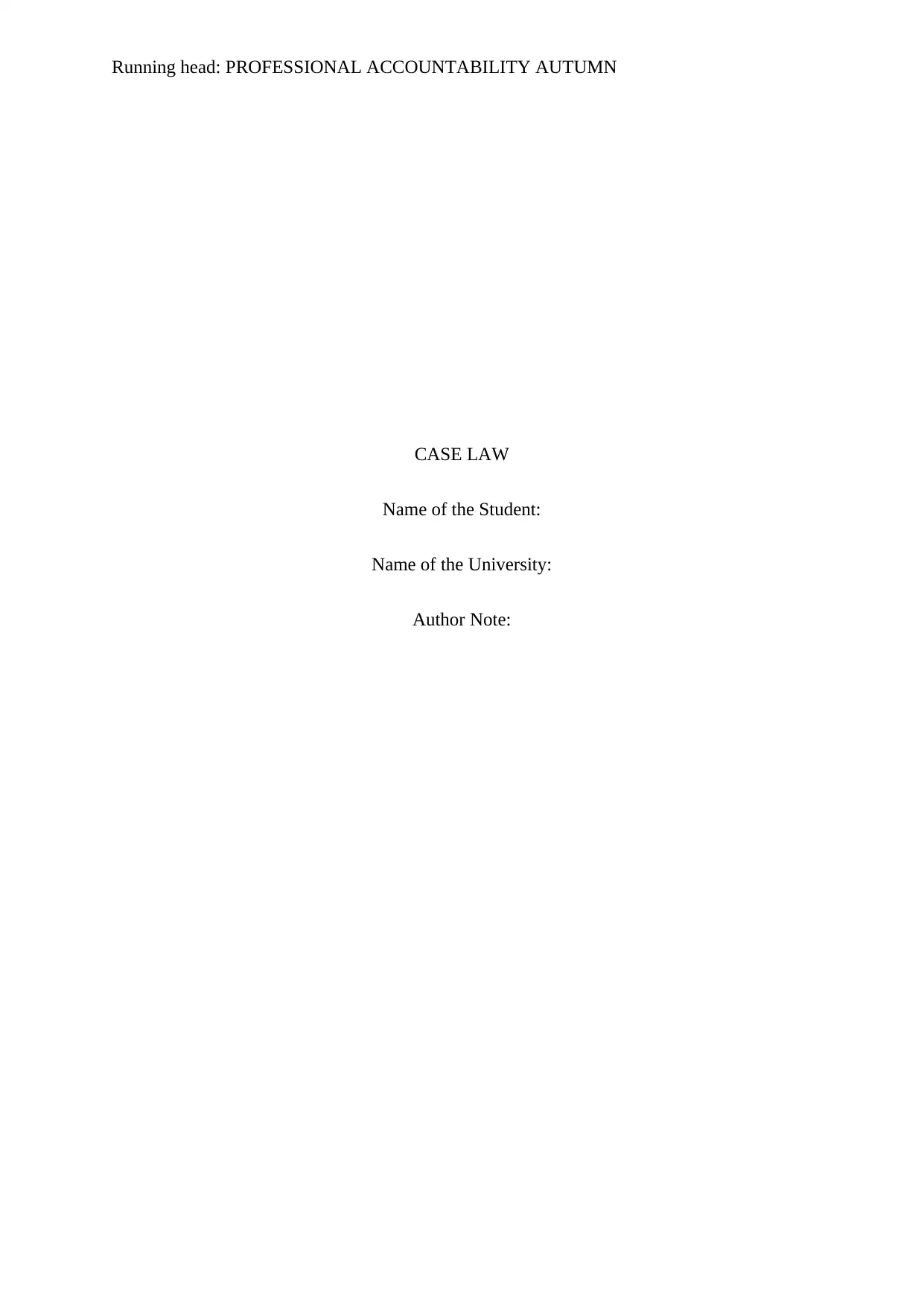
Running head: PROFESSIONAL ACCOUNTABILITY AUTUMN
CASE LAW
Name of the Student:
Name of the University:
Author Note:
CASE LAW
Name of the Student:
Name of the University:
Author Note:
Paraphrase This Document
Need a fresh take? Get an instant paraphrase of this document with our AI Paraphraser
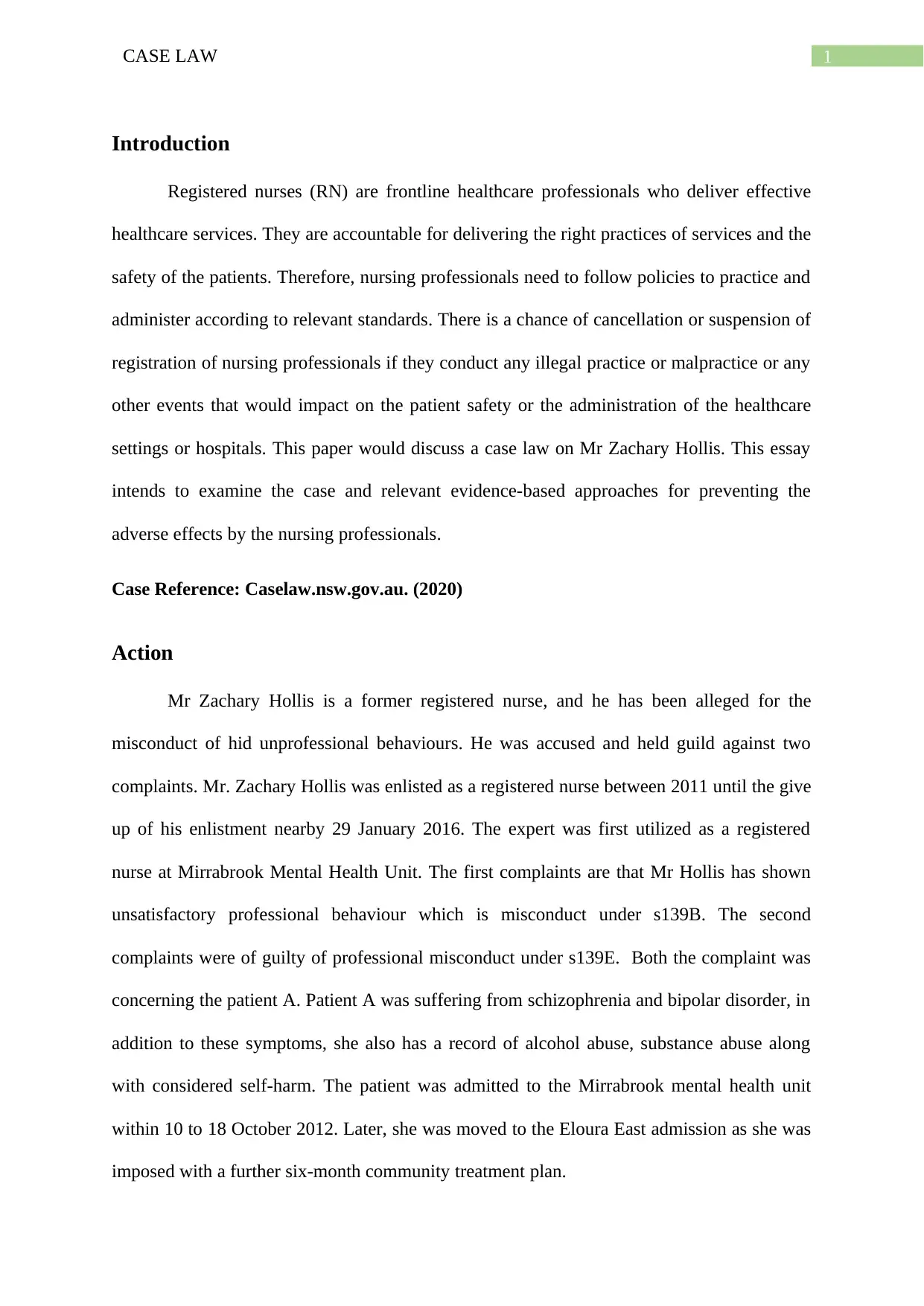
1CASE LAW
Introduction
Registered nurses (RN) are frontline healthcare professionals who deliver effective
healthcare services. They are accountable for delivering the right practices of services and the
safety of the patients. Therefore, nursing professionals need to follow policies to practice and
administer according to relevant standards. There is a chance of cancellation or suspension of
registration of nursing professionals if they conduct any illegal practice or malpractice or any
other events that would impact on the patient safety or the administration of the healthcare
settings or hospitals. This paper would discuss a case law on Mr Zachary Hollis. This essay
intends to examine the case and relevant evidence-based approaches for preventing the
adverse effects by the nursing professionals.
Case Reference: Caselaw.nsw.gov.au. (2020)
Action
Mr Zachary Hollis is a former registered nurse, and he has been alleged for the
misconduct of hid unprofessional behaviours. He was accused and held guild against two
complaints. Mr. Zachary Hollis was enlisted as a registered nurse between 2011 until the give
up of his enlistment nearby 29 January 2016. The expert was first utilized as a registered
nurse at Mirrabrook Mental Health Unit. The first complaints are that Mr Hollis has shown
unsatisfactory professional behaviour which is misconduct under s139B. The second
complaints were of guilty of professional misconduct under s139E. Both the complaint was
concerning the patient A. Patient A was suffering from schizophrenia and bipolar disorder, in
addition to these symptoms, she also has a record of alcohol abuse, substance abuse along
with considered self-harm. The patient was admitted to the Mirrabrook mental health unit
within 10 to 18 October 2012. Later, she was moved to the Eloura East admission as she was
imposed with a further six-month community treatment plan.
Introduction
Registered nurses (RN) are frontline healthcare professionals who deliver effective
healthcare services. They are accountable for delivering the right practices of services and the
safety of the patients. Therefore, nursing professionals need to follow policies to practice and
administer according to relevant standards. There is a chance of cancellation or suspension of
registration of nursing professionals if they conduct any illegal practice or malpractice or any
other events that would impact on the patient safety or the administration of the healthcare
settings or hospitals. This paper would discuss a case law on Mr Zachary Hollis. This essay
intends to examine the case and relevant evidence-based approaches for preventing the
adverse effects by the nursing professionals.
Case Reference: Caselaw.nsw.gov.au. (2020)
Action
Mr Zachary Hollis is a former registered nurse, and he has been alleged for the
misconduct of hid unprofessional behaviours. He was accused and held guild against two
complaints. Mr. Zachary Hollis was enlisted as a registered nurse between 2011 until the give
up of his enlistment nearby 29 January 2016. The expert was first utilized as a registered
nurse at Mirrabrook Mental Health Unit. The first complaints are that Mr Hollis has shown
unsatisfactory professional behaviour which is misconduct under s139B. The second
complaints were of guilty of professional misconduct under s139E. Both the complaint was
concerning the patient A. Patient A was suffering from schizophrenia and bipolar disorder, in
addition to these symptoms, she also has a record of alcohol abuse, substance abuse along
with considered self-harm. The patient was admitted to the Mirrabrook mental health unit
within 10 to 18 October 2012. Later, she was moved to the Eloura East admission as she was
imposed with a further six-month community treatment plan.
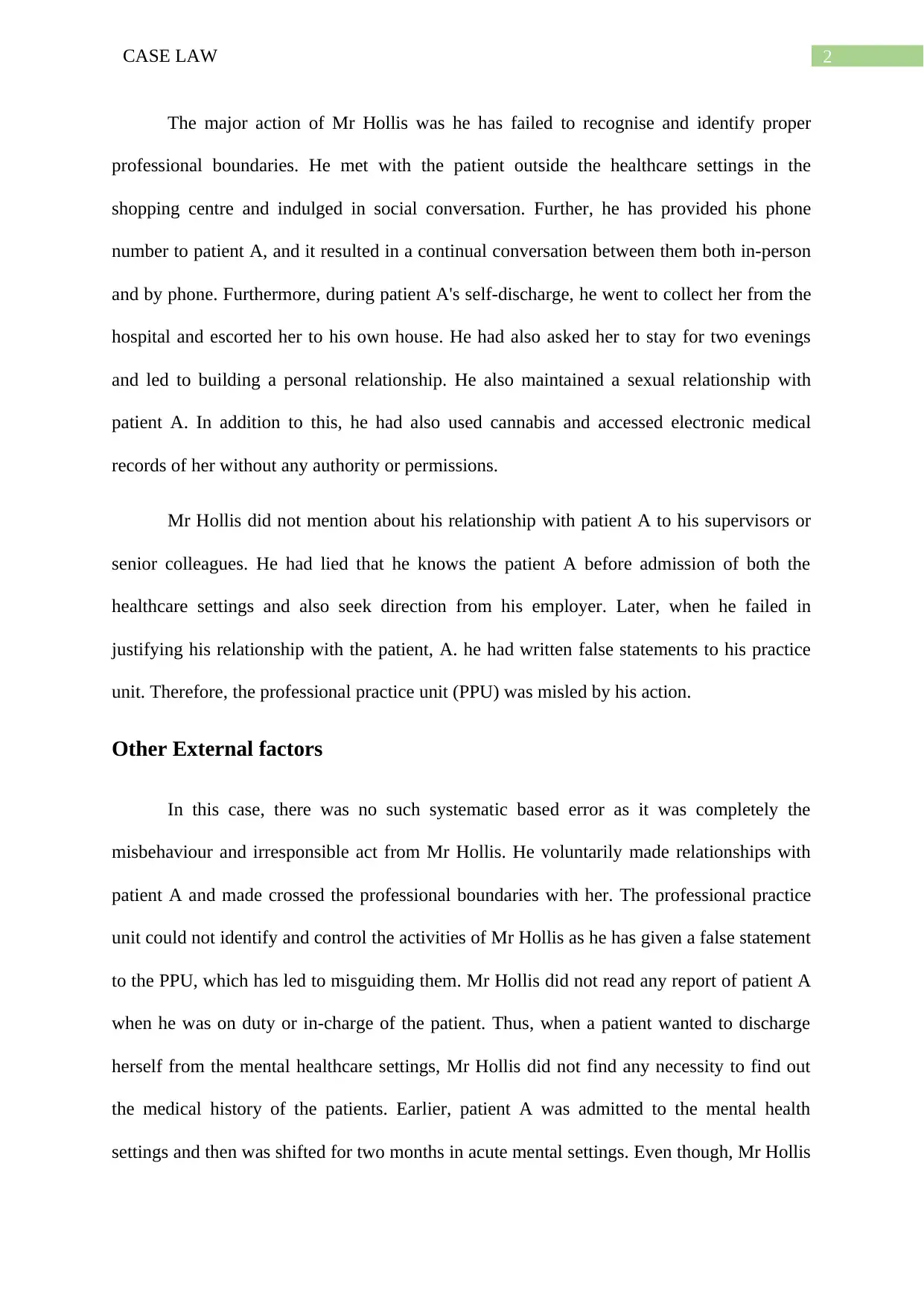
2CASE LAW
The major action of Mr Hollis was he has failed to recognise and identify proper
professional boundaries. He met with the patient outside the healthcare settings in the
shopping centre and indulged in social conversation. Further, he has provided his phone
number to patient A, and it resulted in a continual conversation between them both in-person
and by phone. Furthermore, during patient A's self-discharge, he went to collect her from the
hospital and escorted her to his own house. He had also asked her to stay for two evenings
and led to building a personal relationship. He also maintained a sexual relationship with
patient A. In addition to this, he had also used cannabis and accessed electronic medical
records of her without any authority or permissions.
Mr Hollis did not mention about his relationship with patient A to his supervisors or
senior colleagues. He had lied that he knows the patient A before admission of both the
healthcare settings and also seek direction from his employer. Later, when he failed in
justifying his relationship with the patient, A. he had written false statements to his practice
unit. Therefore, the professional practice unit (PPU) was misled by his action.
Other External factors
In this case, there was no such systematic based error as it was completely the
misbehaviour and irresponsible act from Mr Hollis. He voluntarily made relationships with
patient A and made crossed the professional boundaries with her. The professional practice
unit could not identify and control the activities of Mr Hollis as he has given a false statement
to the PPU, which has led to misguiding them. Mr Hollis did not read any report of patient A
when he was on duty or in-charge of the patient. Thus, when a patient wanted to discharge
herself from the mental healthcare settings, Mr Hollis did not find any necessity to find out
the medical history of the patients. Earlier, patient A was admitted to the mental health
settings and then was shifted for two months in acute mental settings. Even though, Mr Hollis
The major action of Mr Hollis was he has failed to recognise and identify proper
professional boundaries. He met with the patient outside the healthcare settings in the
shopping centre and indulged in social conversation. Further, he has provided his phone
number to patient A, and it resulted in a continual conversation between them both in-person
and by phone. Furthermore, during patient A's self-discharge, he went to collect her from the
hospital and escorted her to his own house. He had also asked her to stay for two evenings
and led to building a personal relationship. He also maintained a sexual relationship with
patient A. In addition to this, he had also used cannabis and accessed electronic medical
records of her without any authority or permissions.
Mr Hollis did not mention about his relationship with patient A to his supervisors or
senior colleagues. He had lied that he knows the patient A before admission of both the
healthcare settings and also seek direction from his employer. Later, when he failed in
justifying his relationship with the patient, A. he had written false statements to his practice
unit. Therefore, the professional practice unit (PPU) was misled by his action.
Other External factors
In this case, there was no such systematic based error as it was completely the
misbehaviour and irresponsible act from Mr Hollis. He voluntarily made relationships with
patient A and made crossed the professional boundaries with her. The professional practice
unit could not identify and control the activities of Mr Hollis as he has given a false statement
to the PPU, which has led to misguiding them. Mr Hollis did not read any report of patient A
when he was on duty or in-charge of the patient. Thus, when a patient wanted to discharge
herself from the mental healthcare settings, Mr Hollis did not find any necessity to find out
the medical history of the patients. Earlier, patient A was admitted to the mental health
settings and then was shifted for two months in acute mental settings. Even though, Mr Hollis
⊘ This is a preview!⊘
Do you want full access?
Subscribe today to unlock all pages.

Trusted by 1+ million students worldwide
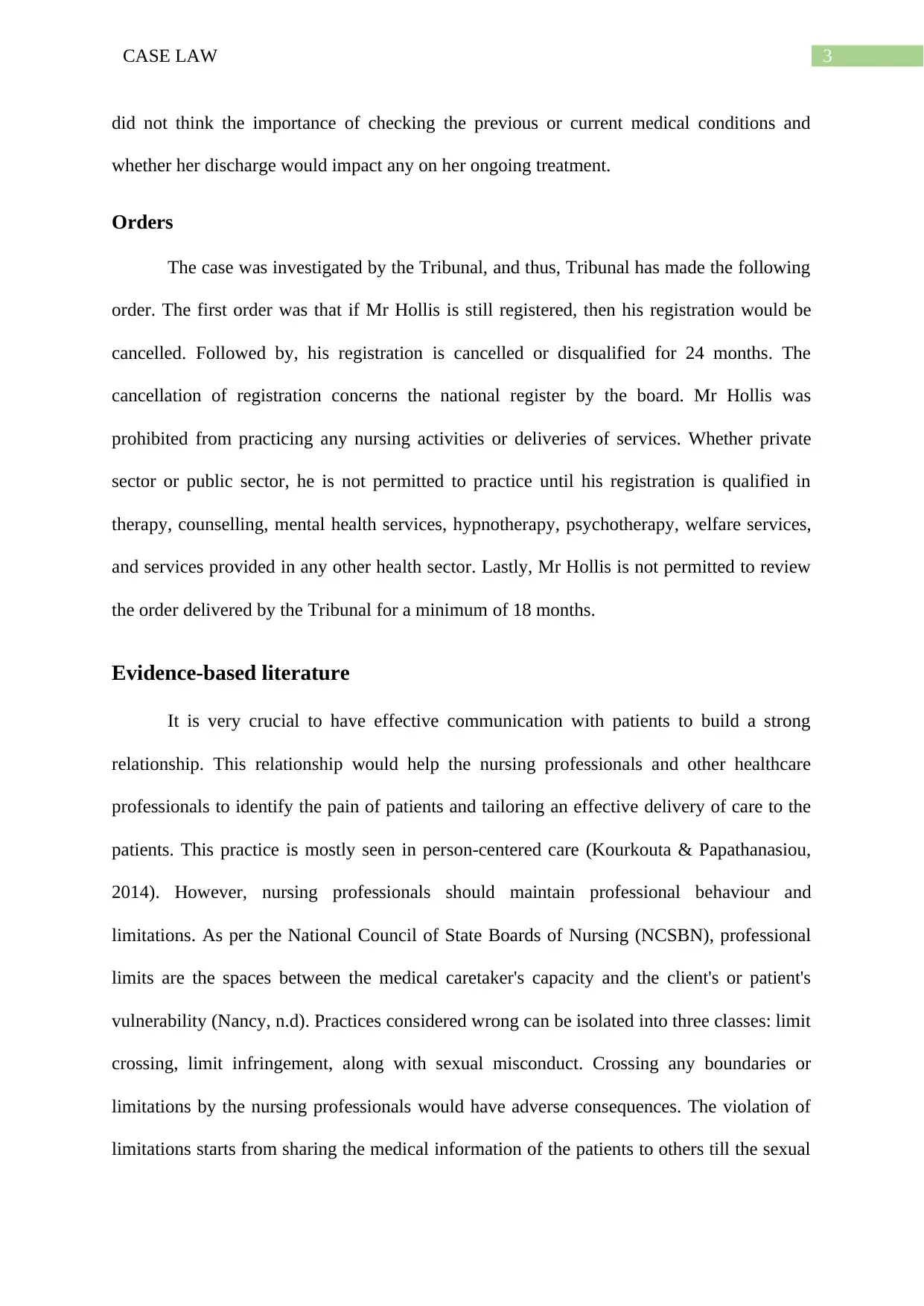
3CASE LAW
did not think the importance of checking the previous or current medical conditions and
whether her discharge would impact any on her ongoing treatment.
Orders
The case was investigated by the Tribunal, and thus, Tribunal has made the following
order. The first order was that if Mr Hollis is still registered, then his registration would be
cancelled. Followed by, his registration is cancelled or disqualified for 24 months. The
cancellation of registration concerns the national register by the board. Mr Hollis was
prohibited from practicing any nursing activities or deliveries of services. Whether private
sector or public sector, he is not permitted to practice until his registration is qualified in
therapy, counselling, mental health services, hypnotherapy, psychotherapy, welfare services,
and services provided in any other health sector. Lastly, Mr Hollis is not permitted to review
the order delivered by the Tribunal for a minimum of 18 months.
Evidence-based literature
It is very crucial to have effective communication with patients to build a strong
relationship. This relationship would help the nursing professionals and other healthcare
professionals to identify the pain of patients and tailoring an effective delivery of care to the
patients. This practice is mostly seen in person-centered care (Kourkouta & Papathanasiou,
2014). However, nursing professionals should maintain professional behaviour and
limitations. As per the National Council of State Boards of Nursing (NCSBN), professional
limits are the spaces between the medical caretaker's capacity and the client's or patient's
vulnerability (Nancy, n.d). Practices considered wrong can be isolated into three classes: limit
crossing, limit infringement, along with sexual misconduct. Crossing any boundaries or
limitations by the nursing professionals would have adverse consequences. The violation of
limitations starts from sharing the medical information of the patients to others till the sexual
did not think the importance of checking the previous or current medical conditions and
whether her discharge would impact any on her ongoing treatment.
Orders
The case was investigated by the Tribunal, and thus, Tribunal has made the following
order. The first order was that if Mr Hollis is still registered, then his registration would be
cancelled. Followed by, his registration is cancelled or disqualified for 24 months. The
cancellation of registration concerns the national register by the board. Mr Hollis was
prohibited from practicing any nursing activities or deliveries of services. Whether private
sector or public sector, he is not permitted to practice until his registration is qualified in
therapy, counselling, mental health services, hypnotherapy, psychotherapy, welfare services,
and services provided in any other health sector. Lastly, Mr Hollis is not permitted to review
the order delivered by the Tribunal for a minimum of 18 months.
Evidence-based literature
It is very crucial to have effective communication with patients to build a strong
relationship. This relationship would help the nursing professionals and other healthcare
professionals to identify the pain of patients and tailoring an effective delivery of care to the
patients. This practice is mostly seen in person-centered care (Kourkouta & Papathanasiou,
2014). However, nursing professionals should maintain professional behaviour and
limitations. As per the National Council of State Boards of Nursing (NCSBN), professional
limits are the spaces between the medical caretaker's capacity and the client's or patient's
vulnerability (Nancy, n.d). Practices considered wrong can be isolated into three classes: limit
crossing, limit infringement, along with sexual misconduct. Crossing any boundaries or
limitations by the nursing professionals would have adverse consequences. The violation of
limitations starts from sharing the medical information of the patients to others till the sexual
Paraphrase This Document
Need a fresh take? Get an instant paraphrase of this document with our AI Paraphraser
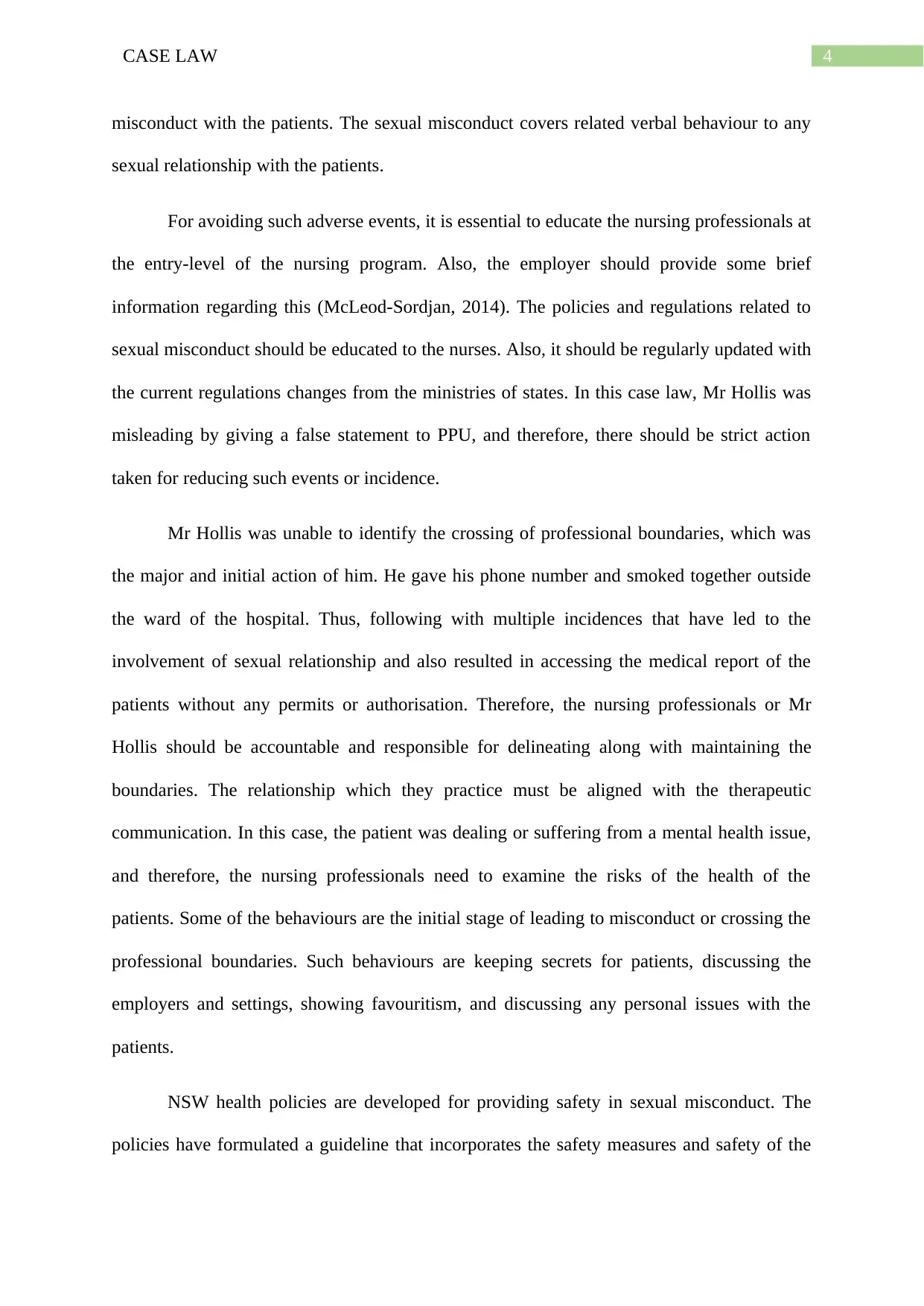
4CASE LAW
misconduct with the patients. The sexual misconduct covers related verbal behaviour to any
sexual relationship with the patients.
For avoiding such adverse events, it is essential to educate the nursing professionals at
the entry-level of the nursing program. Also, the employer should provide some brief
information regarding this (McLeod-Sordjan, 2014). The policies and regulations related to
sexual misconduct should be educated to the nurses. Also, it should be regularly updated with
the current regulations changes from the ministries of states. In this case law, Mr Hollis was
misleading by giving a false statement to PPU, and therefore, there should be strict action
taken for reducing such events or incidence.
Mr Hollis was unable to identify the crossing of professional boundaries, which was
the major and initial action of him. He gave his phone number and smoked together outside
the ward of the hospital. Thus, following with multiple incidences that have led to the
involvement of sexual relationship and also resulted in accessing the medical report of the
patients without any permits or authorisation. Therefore, the nursing professionals or Mr
Hollis should be accountable and responsible for delineating along with maintaining the
boundaries. The relationship which they practice must be aligned with the therapeutic
communication. In this case, the patient was dealing or suffering from a mental health issue,
and therefore, the nursing professionals need to examine the risks of the health of the
patients. Some of the behaviours are the initial stage of leading to misconduct or crossing the
professional boundaries. Such behaviours are keeping secrets for patients, discussing the
employers and settings, showing favouritism, and discussing any personal issues with the
patients.
NSW health policies are developed for providing safety in sexual misconduct. The
policies have formulated a guideline that incorporates the safety measures and safety of the
misconduct with the patients. The sexual misconduct covers related verbal behaviour to any
sexual relationship with the patients.
For avoiding such adverse events, it is essential to educate the nursing professionals at
the entry-level of the nursing program. Also, the employer should provide some brief
information regarding this (McLeod-Sordjan, 2014). The policies and regulations related to
sexual misconduct should be educated to the nurses. Also, it should be regularly updated with
the current regulations changes from the ministries of states. In this case law, Mr Hollis was
misleading by giving a false statement to PPU, and therefore, there should be strict action
taken for reducing such events or incidence.
Mr Hollis was unable to identify the crossing of professional boundaries, which was
the major and initial action of him. He gave his phone number and smoked together outside
the ward of the hospital. Thus, following with multiple incidences that have led to the
involvement of sexual relationship and also resulted in accessing the medical report of the
patients without any permits or authorisation. Therefore, the nursing professionals or Mr
Hollis should be accountable and responsible for delineating along with maintaining the
boundaries. The relationship which they practice must be aligned with the therapeutic
communication. In this case, the patient was dealing or suffering from a mental health issue,
and therefore, the nursing professionals need to examine the risks of the health of the
patients. Some of the behaviours are the initial stage of leading to misconduct or crossing the
professional boundaries. Such behaviours are keeping secrets for patients, discussing the
employers and settings, showing favouritism, and discussing any personal issues with the
patients.
NSW health policies are developed for providing safety in sexual misconduct. The
policies have formulated a guideline that incorporates the safety measures and safety of the
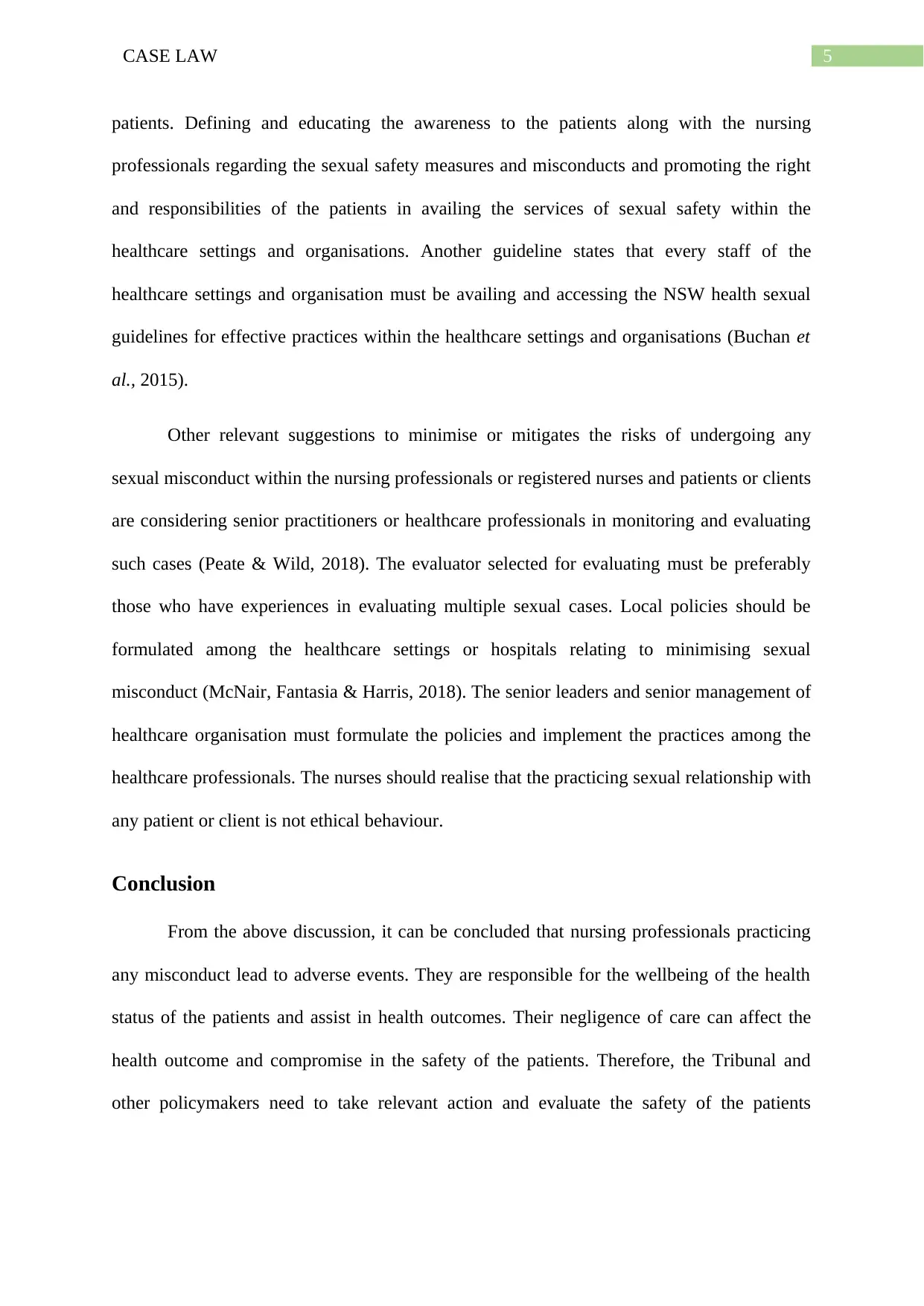
5CASE LAW
patients. Defining and educating the awareness to the patients along with the nursing
professionals regarding the sexual safety measures and misconducts and promoting the right
and responsibilities of the patients in availing the services of sexual safety within the
healthcare settings and organisations. Another guideline states that every staff of the
healthcare settings and organisation must be availing and accessing the NSW health sexual
guidelines for effective practices within the healthcare settings and organisations (Buchan et
al., 2015).
Other relevant suggestions to minimise or mitigates the risks of undergoing any
sexual misconduct within the nursing professionals or registered nurses and patients or clients
are considering senior practitioners or healthcare professionals in monitoring and evaluating
such cases (Peate & Wild, 2018). The evaluator selected for evaluating must be preferably
those who have experiences in evaluating multiple sexual cases. Local policies should be
formulated among the healthcare settings or hospitals relating to minimising sexual
misconduct (McNair, Fantasia & Harris, 2018). The senior leaders and senior management of
healthcare organisation must formulate the policies and implement the practices among the
healthcare professionals. The nurses should realise that the practicing sexual relationship with
any patient or client is not ethical behaviour.
Conclusion
From the above discussion, it can be concluded that nursing professionals practicing
any misconduct lead to adverse events. They are responsible for the wellbeing of the health
status of the patients and assist in health outcomes. Their negligence of care can affect the
health outcome and compromise in the safety of the patients. Therefore, the Tribunal and
other policymakers need to take relevant action and evaluate the safety of the patients
patients. Defining and educating the awareness to the patients along with the nursing
professionals regarding the sexual safety measures and misconducts and promoting the right
and responsibilities of the patients in availing the services of sexual safety within the
healthcare settings and organisations. Another guideline states that every staff of the
healthcare settings and organisation must be availing and accessing the NSW health sexual
guidelines for effective practices within the healthcare settings and organisations (Buchan et
al., 2015).
Other relevant suggestions to minimise or mitigates the risks of undergoing any
sexual misconduct within the nursing professionals or registered nurses and patients or clients
are considering senior practitioners or healthcare professionals in monitoring and evaluating
such cases (Peate & Wild, 2018). The evaluator selected for evaluating must be preferably
those who have experiences in evaluating multiple sexual cases. Local policies should be
formulated among the healthcare settings or hospitals relating to minimising sexual
misconduct (McNair, Fantasia & Harris, 2018). The senior leaders and senior management of
healthcare organisation must formulate the policies and implement the practices among the
healthcare professionals. The nurses should realise that the practicing sexual relationship with
any patient or client is not ethical behaviour.
Conclusion
From the above discussion, it can be concluded that nursing professionals practicing
any misconduct lead to adverse events. They are responsible for the wellbeing of the health
status of the patients and assist in health outcomes. Their negligence of care can affect the
health outcome and compromise in the safety of the patients. Therefore, the Tribunal and
other policymakers need to take relevant action and evaluate the safety of the patients
⊘ This is a preview!⊘
Do you want full access?
Subscribe today to unlock all pages.

Trusted by 1+ million students worldwide
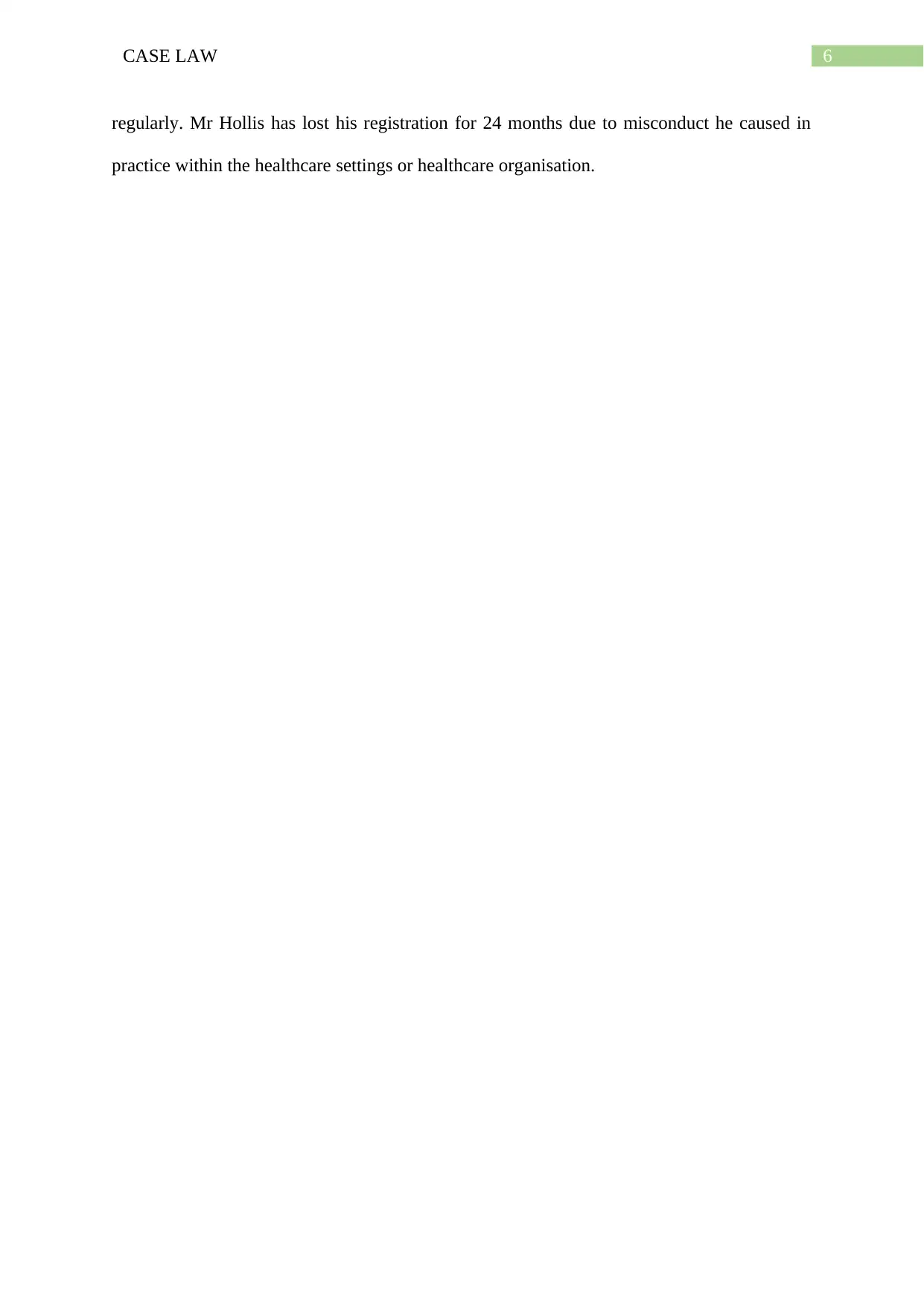
6CASE LAW
regularly. Mr Hollis has lost his registration for 24 months due to misconduct he caused in
practice within the healthcare settings or healthcare organisation.
regularly. Mr Hollis has lost his registration for 24 months due to misconduct he caused in
practice within the healthcare settings or healthcare organisation.
Paraphrase This Document
Need a fresh take? Get an instant paraphrase of this document with our AI Paraphraser
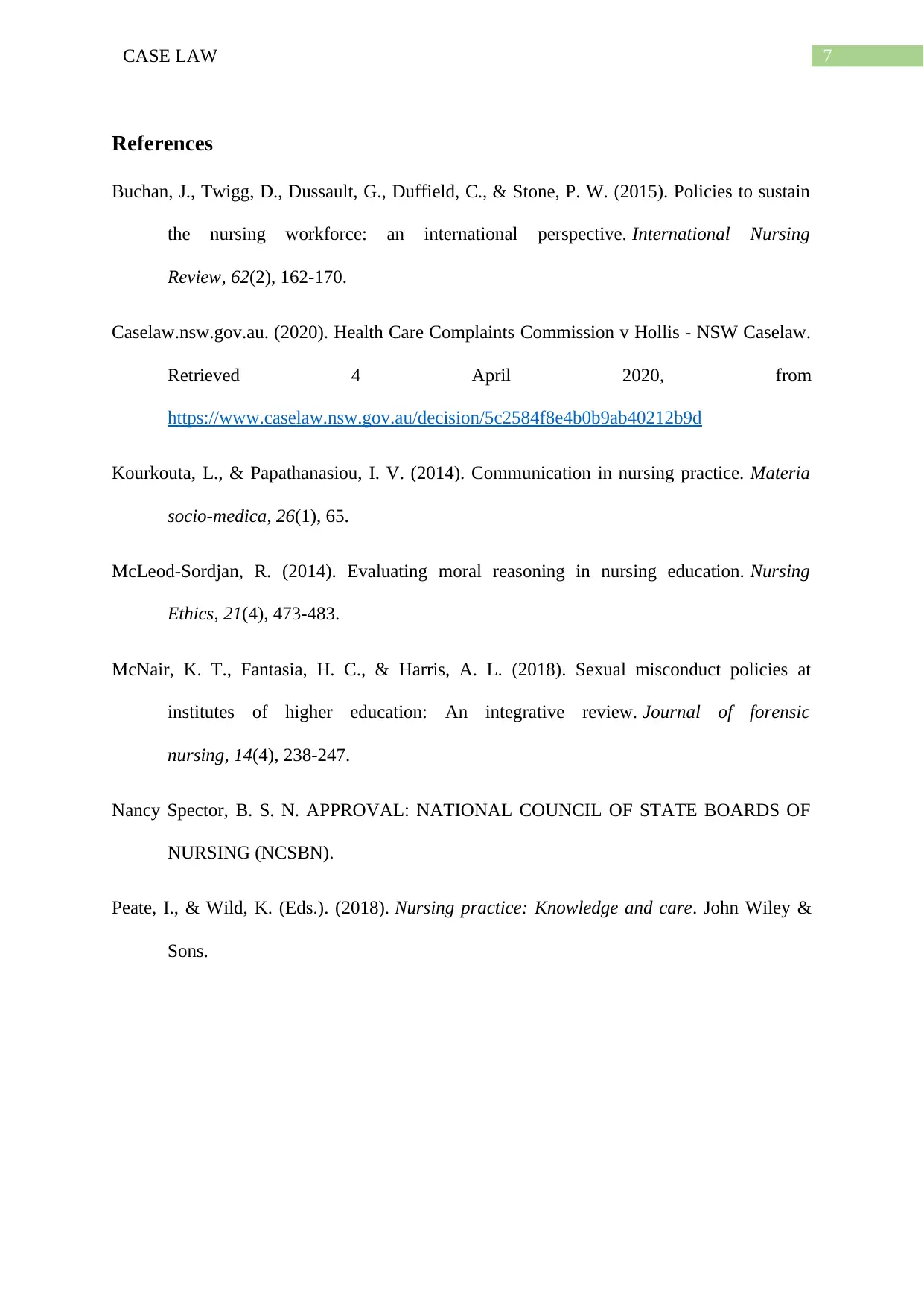
7CASE LAW
References
Buchan, J., Twigg, D., Dussault, G., Duffield, C., & Stone, P. W. (2015). Policies to sustain
the nursing workforce: an international perspective. International Nursing
Review, 62(2), 162-170.
Caselaw.nsw.gov.au. (2020). Health Care Complaints Commission v Hollis - NSW Caselaw.
Retrieved 4 April 2020, from
https://www.caselaw.nsw.gov.au/decision/5c2584f8e4b0b9ab40212b9d
Kourkouta, L., & Papathanasiou, I. V. (2014). Communication in nursing practice. Materia
socio-medica, 26(1), 65.
McLeod-Sordjan, R. (2014). Evaluating moral reasoning in nursing education. Nursing
Ethics, 21(4), 473-483.
McNair, K. T., Fantasia, H. C., & Harris, A. L. (2018). Sexual misconduct policies at
institutes of higher education: An integrative review. Journal of forensic
nursing, 14(4), 238-247.
Nancy Spector, B. S. N. APPROVAL: NATIONAL COUNCIL OF STATE BOARDS OF
NURSING (NCSBN).
Peate, I., & Wild, K. (Eds.). (2018). Nursing practice: Knowledge and care. John Wiley &
Sons.
References
Buchan, J., Twigg, D., Dussault, G., Duffield, C., & Stone, P. W. (2015). Policies to sustain
the nursing workforce: an international perspective. International Nursing
Review, 62(2), 162-170.
Caselaw.nsw.gov.au. (2020). Health Care Complaints Commission v Hollis - NSW Caselaw.
Retrieved 4 April 2020, from
https://www.caselaw.nsw.gov.au/decision/5c2584f8e4b0b9ab40212b9d
Kourkouta, L., & Papathanasiou, I. V. (2014). Communication in nursing practice. Materia
socio-medica, 26(1), 65.
McLeod-Sordjan, R. (2014). Evaluating moral reasoning in nursing education. Nursing
Ethics, 21(4), 473-483.
McNair, K. T., Fantasia, H. C., & Harris, A. L. (2018). Sexual misconduct policies at
institutes of higher education: An integrative review. Journal of forensic
nursing, 14(4), 238-247.
Nancy Spector, B. S. N. APPROVAL: NATIONAL COUNCIL OF STATE BOARDS OF
NURSING (NCSBN).
Peate, I., & Wild, K. (Eds.). (2018). Nursing practice: Knowledge and care. John Wiley &
Sons.
1 out of 8
Related Documents
Your All-in-One AI-Powered Toolkit for Academic Success.
+13062052269
info@desklib.com
Available 24*7 on WhatsApp / Email
![[object Object]](/_next/static/media/star-bottom.7253800d.svg)
Unlock your academic potential
Copyright © 2020–2025 A2Z Services. All Rights Reserved. Developed and managed by ZUCOL.





